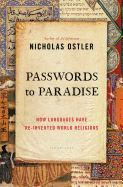
Nicholas Ostler (Empires of the Word) begins Passwords to Paradise: How Languages Have Re-Invented World Religions by examining how all religions begin life in a particular language. Once the religion has become established and travels beyond its original geographical boundaries, its "passwords to paradise" must then be translated and communicated in new languages.
In particular, Ostler traces the linguistic migration of three big missionary religions--Christianity, Buddhism and Islam. He analyzes regional vocabulary, grammar and written forms to show how the translation of scripture to local languages modified scriptural interpretations and reinforced national identities. Buddhism was adapted into Gandhari, the lingua franca of Central Asian trade routes, allowing it to proliferate in written form. When Gandhari traders took Buddhism into China, scholars who adapted Buddhist teachings to the format of Chinese classics misinterpreted certain phrases, changing their meaning. Christianity followed a similar route, evolving from spoken Aramaic to Greek, the official language of trade in the early Roman Empire. As Christianity traveled west across the Roman Empire, its translation into the Latin vernacular generated wider appeal. Christianity evolved from a religion of the few to a religion embraced, codified and favored by the ruling emperor, only to be divided philosophically by the language communities of Northern Europe. Islam required converts to adopt Arabic in practice, insisting "that its revelation... is only truly available to those who understand" the language.
Passwords to Paradise is a scholarly work intended for linguists, but Ostler's extensive research and well-drawn conclusions should make this an intriguing read for religious history buffs. --Nancy Powell, freelance writer and technical consultant

